

Haiku Learning : Year 11 Studies of Religion 2015 : Year 11 Studies of Religion. Religion. Contents of Religion Page 1.
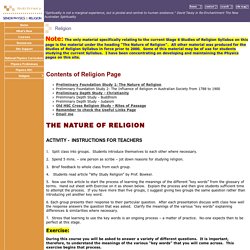
Split class into groups. Students introduce themselves to each other where necessary. 2. Spend 5 mins. – one person as scribe – jot down reasons for studying religion. 3. 4. 5. 6. 7. Miss Niven's Year 11 Studies of Religion - Term 01 Lesson 04. Preliminary SOR (Year 11) HI THERE AND WELCOME TO THIS PAGE!

Please report dead links. Thanks! The following resources below exist solely for the purposes of research via the NSW HSC Course - Studies of Religion (see disclaimer below). This course is studied in many Christian Schools; hence its coverage on the 'Christian Faith' website. YEAR 11 resources are also found on our main STUDIES OF RELIGION page, so make sure you check out this VERY important page. Also ... STRONGLY RECOMMMENDED: Waverley Y11 SOR PAGE Hughes SOR Mr Achmar's page: Year 11 PANGO HSC Studies of Religion: Extensive coverage - do NOT ignore this site! Then please let us know by CONTACTING US. Aboriginal & Torres Strait Islander Studies (University of Queensland). CHAPTER 1 (free download - pdf): Cambridge Studies of Religion Stage 6 Second Edition PEARSON Review. Jewish teaching resources, lesson plans, & activities.
Marsha B. Cohen's Jewish Ethics Resource Site. 18 Pomegranates - Lesson Plans Test. Halakhah: Jewish Law. What is Halakhah?
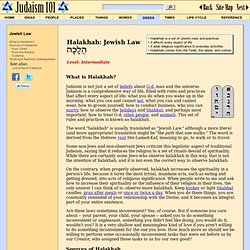
Judaism is not just a set of beliefs about G-d, man and the universe. Judaism is a comprehensive way of life, filled with rules and practices that affect every aspect of life: what you do when you wake up in the morning, what you can and cannot eat, what you can and cannot wear, how to groom yourself, how to conduct business, who you can marry, how to observe the holidays and Shabbat, and perhaps most important, how to treat G-d, other people, and animals. This set of rules and practices is known as halakhah. The word "halakhah" is usually translated as "Jewish Law," although a more literal (and more appropriate) translation might be "the path that one walks. " The word is derived from the Hebrew root Hei-Lamed-Kaf, meaning to go, to walk or to travel. Some non-Jews and non-observant Jews criticize this legalistic aspect of traditional Judaism, saying that it reduces the religion to a set of rituals devoid of spirituality.
Are these laws sometimes inconvenient? Part 2. Prophets. PART 2 • ProphetsPrologue to the Prophets 185 PART 2 • ProphetsPrologue to the Prophets 186 Prologue to the Prophets 1 Introduction 2 Former Prophets 3 Latter Prophets 4 The Prophets as a Whole Study Guide.
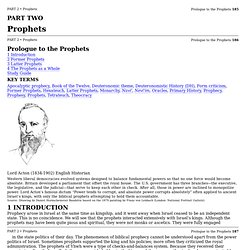
Book of Proverbs. Ethics. There is no abstract, comprehensive concept in the Bible which parallels the modern concept of "ethics.
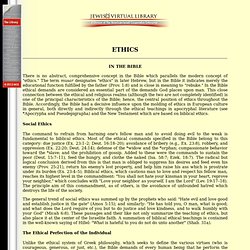
" The term musar designates "ethics" in later Hebrew, but in the Bible it indicates merely the educational function fulfilled by the father (Prov. 1:8) and is close in meaning to "rebuke. " In the Bible ethical demands are considered an essential part of the demands God places upon man. Jewish Ethics: Some Basic Concepts and Ideas. The biblical text and the rabbinic tradition provide the universal search for an ethical life with passion and some unique concepts.

The rabbis of late antiquity, building upon the Hebrew Bible, shaped the terms and categories of practical ethics that have guided discussions of ethical issues in Jewish life for the past two millennia. We Also Recommend. Judaism and Ethics. Judaism is much more than just a religion: it is a way of life.
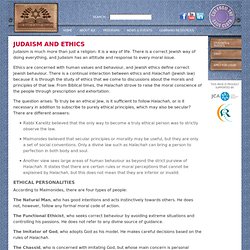
Principles of Moral Thought and Action. Written by: Allan Nadler Jewish ethicists today vary widely in their approaches to handling thorny moral issues, such as birth control, abortion, euthanasia, attitudes to women and homosexuals, and political questions such as the morality of warfare and the religious significance of the State of Israel.

Orthodox, Conservative, and other traditionalist ethicists tend to rely almost entirely on rabbinic legal precedent as the authoritative source for deciding controversial moral and ethical questions. In this, they differ dramatically both from Christian ethicists whose approach to the same questions is far more theologically rooted, and Reform Jewish ethicists, who do not feel constrained or bound by classical rabbinic halakha. For example, when discussing abortion, Jewish ethicists do not refer to theological questions about the nature and origins of the human soul or to when it is first conceived. Study Questions:1. Core Ethical Teachings of Judaism - Israel & Judaism Studies. Freedom The mountain fortess of Masada, where in 73CE over 900 Jews committed suicide to die in freedom rather than submit to slavery and worse under Roman rule “Once we were slaves in Egypt, now we are free people,” Jews remind themselves three times a day in their prayers and in the prayer before and after the Sabbath meal.

This centrality of freedom in Jewish thought has various implications. Jewish Beliefs. 131Google + Judaism is one of the oldest religions in the world.

Their sacred text, the Hebrew Bible, teaches several doctrines - such as those about God, the Messiah, human beings, and the universe - making beliefs very important to Jews. Judaism has no official creed, however. Judaism shares some beliefs with other world religions, like monotheism with Christianity and Islam, but in other respects there are sharp differences between the faiths.